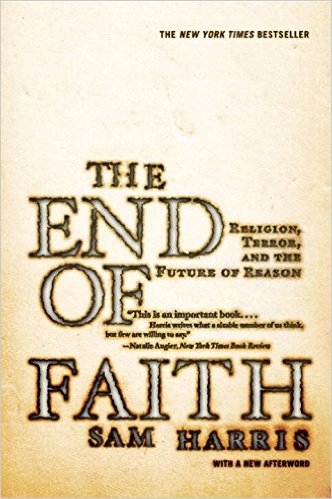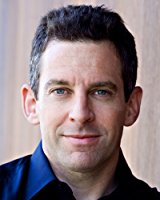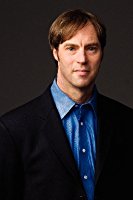- Paperback: ۳۴۸ pages
- Publisher: W. W. Norton; Reprint edition (September 17, 2005)
- Language: English
- ISBN-10: ۰۳۹۳۳۲۷۶۵۵
- ISBN-13: ۹۷۸-۰۳۹۳۳۲۷۶۵۶
- Product Dimensions: ۵.۵ x 1.1 x 8.3 inches
- Shipping Weight: ۱۰.۴ ounces (View shipping rates and policies)
- Average Customer Review: ۴.۳ out of 5 stars See all reviews (۱,۳۲۲ customer reviews)
The End of Faith: Religion, Terror, and the Future of Reason
0 تومان
by Sam Harris
“The End of Faith articulates the dangers and absurdities of organized religion so fiercely and so fearlessly that I felt relieved as I read it, vindicated….Harris writes what a sizable number of us think, but few are willing to say.”―Natalie Angier, ?New York Times
In ?The End of Faith?, Sam Harris delivers a startling analysis of the clash between reason and religion in the modern world. He offers a vivid, historical tour of our willingness to suspend reason in favor of religious beliefs―even when these beliefs inspire the worst human atrocities. While warning against the encroachment of organized religion into world politics, Harris draws on insights from neuroscience, philosophy, and Eastern mysticism to deliver a call for a truly modern foundation for ethics and spirituality that is both secular and humanistic. Winner of the 2005 PEN/Martha Albrand Award for Nonfiction.
محصولات مرتبط
automobile electrical and electronic systems
by Tom Denton
This textbook will help you learn all the skills you need to pass Level 3 Vehicle Electrical and Electronic Systems courses or related modules from City and Guilds, IMI Awards and BTEC. It is also ideal for ASE, AUR and higher level qualifications.
As electrical and electronic systems become increasingly more complex and fundamental to the workings of modern vehicles, understanding these systems is essential for automotive technicians. For students new to the subject, this book will help to develop this knowledge, but will also assist experienced mechanics in keeping up with recent technological advances. This new edition includes information on developments in hybrid car technology, GPS, multiplexing, and electronic stability/vehicle dynamics control. In full colour and covering the latest course specifications, this is the guide that no student enrolled on an automotive maintenance and repair course should be without.
Designed to make learning easier, this book contains:
- Photographs, flow charts, quick reference tables, overview descriptions and step-by-step instructions
- Case studies to help you put the principles covered into real-life context
- Useful margin features throughout, including definitions, key facts and ‘safety first’ considerations
Biocentrism: How Life and Consciousness are the Keys to Understanding the True Nature of the Universe
by Robert Lanza (Author), Bob Berman (Author)
Robert Lanza is one of the most respected scientists in the world—a US News & World Report cover story called him a “genius” and a “renegade thinker,” even likening him to Einstein. Lanza has teamed with Bob Berman, the most widely read astronomer in the world, to produce Biocentrism, a revolutionary new view of the universe.
Every now and then a simple yet radical idea shakes the very foundations of knowledge. The startling discovery that the world was not flat challenged and ultimately changed the way people perceived themselves and their relationship with the world. For most humans of the 15th century, the notion of Earth as ball of rock was nonsense. The whole of Western, natural philosophy is undergoing a sea change again, increasingly being forced upon us by the experimental findings of quantum theory, and at the same time, towards doubt and uncertainty in the physical explanations of the universe’s genesis and structure. Biocentrism completes this shift in worldview, turning the planet upside down again with the revolutionary view that life creates the universe instead of the other way around.
In this paradigm, life is not an accidental byproduct of the laws of physics. Biocentrism takes the reader on a seemingly improbable but ultimately inescapable journey through a foreign universe—our own—from the viewpoints of an acclaimed biologist and a leading astronomer. Switching perspective from physics to biology unlocks the cages in which Western science has unwittingly managed to confine itself. Biocentrism will shatter the reader’s ideas of life—time and space, and even death. At the same time it will release us from the dull worldview of life being merely the activity of an admixture of carbon and a few other elements; it suggests the exhilarating possibility that life is fundamentally immortal.
The 21st century is predicted to be the Century of Biology, a shift from the previous century dominated by physics. It seems fitting, then, to begin the century by turning the universe outside-in and unifying the foundations of science with a simple idea discovered by one of the leading life-scientists of our age. Biocentrism awakens in readers a new sense of possibility, and is full of so many shocking new perspectives that the reader will never see reality the same way again.
Bosch Automotive Electrics and Automotive Electronics
by Robert Bosch GmbH
This is a complete reference guide to automotive electrics and electronics. This new edition of the definitive reference for automotive engineers, compiled by one of the world's largest automotive equipment suppliers, includes new and updated material. As in previous editions different topics are covered in a concise but descriptive way backed up by diagrams, graphs, photographs and tables enabling the reader to better comprehend the subject. This fifth edition revises the classical topics of the vehicle electrical systems such as system architecture, control, components and sensors. There is now greater detail on electronics and their application in the motor vehicle, including electrical energy management (EEM) and discusses the topic of inter system networking within the vehicle. It also includes a description of the concept of hybrid drive a topic that is particularly current due to its ability to reduce fuel consumption and therefore CO2 emissions.This book will benefit automotive engineers and design engineers, automotive technicians in training and mechanics and technicians in garages. It may also be of interest to teachers/ lecturers and students at vocational colleges, and enthusiasts.
Darwin’s Doubt: The Explosive Origin of Animal Life and the Case for Intelligent Design
by Stephen C. Meyer
When Charles Darwin finished The Origin of Species, he thought that he had explained every clue, but one. Though his theory could explain many facts, Darwin knew that there was a significant event in the history of life that his theory did not explain. During this event, the “Cambrian explosion,” many animals suddenly appeared in the fossil record without apparent ancestors in earlier layers of rock.
In Darwin’s Doubt, Stephen C. Meyer tells the story of the mystery surrounding this explosion of animal life—a mystery that has intensified, not only because the expected ancestors of these animals have not been found, but because scientists have learned more about what it takes to construct an animal. During the last half century, biologists have come to appreciate the central importance of biological information—stored in DNA and elsewhere in cells—to building animal forms.
Expanding on the compelling case he presented in his last book, Signature in the Cell, Meyer argues that the origin of this information, as well as other mysterious features of the Cambrian event, are best explained by intelligent design, rather than purely undirected evolutionary processes.
Death by Black Hole: And Other Cosmic Quandaries
by Neil deGrasse Tyson
“[Tyson] tackles a great range of subjects . . . with great humor, humility, and―most important― humanity.” ―Entertainment Weekly
Loyal readers of the monthly "Universe" essays in Natural History magazine have long recognized Neil deGrasse Tyson's talent for guiding them through the mysteries of the cosmos with clarity and enthusiasm. Bringing together more than forty of Tyson's favorite essays, ?Death by Black Hole? explores a myriad of cosmic topics, from what it would be like to be inside a black hole to the movie industry's feeble efforts to get its night skies right. One of America's best-known astrophysicists, Tyson is a natural teacher who simplifies the complexities of astrophysics while sharing his infectious fascination for our universe.
Life on the Edge: The Coming of Age of Quantum Biology
by Johnjoe McFadden
New York Times Bestseller and an Amazon Best Science Book of 2015
Life is the most extraordinary phenomenon in the known universe; but how did it come to be? Even in an age of cloning and artificial biology, the remarkable truth remains: nobody has ever made anything living entirely out of dead material. Life remains the only way to make life. Are we still missing a vital ingredient in its creation?
Like Richard Dawkins' The Selfish Gene, which provided a new perspective on how evolution works, Life on the Edge alters our understanding of our world's fundamental dynamics. Bringing together first-hand experience at the cutting edge of science with unparalleled gifts of explanation, Jim Al-Khalili and Johnjoe Macfadden reveal that missing ingredient to be quantum mechanics; the phenomena that lie at the heart of this most mysterious of sciences.
Drawing on recent ground-breaking experiments around the world, each chapter in Life on the Edge engages by illustrating one of life's puzzles: How do migrating birds know where to go? How do we really smell the scent of a rose? How do our genes copy themselves with such precision? Life on the Edge accessibly reveals how quantum mechanics can answer these probing questions of the universe.
Guiding the reader through the rapidly unfolding discoveries of the last few years, Al-Khalili and McFadden communicate the excitement of the explosive new field of quantum biology and its potentially revolutionary applications, while offering insights into the biggest puzzle of all: what is life? As they brilliantly demonstrate in these groundbreaking pages, life exists on the quantum edge.
– Winner, Stephen Hawking Medal for Science Communication
Practical Electronics for Inventors, Fourth Edition
by Paul Scherz (Author), Simon Monk (Author)
A Fully-Updated, No-Nonsense Guide to Electronics
Advance your electronics knowledge and gain the skills necessary to develop and construct your own functioning gadgets. Written by a pair of experienced engineers and dedicated hobbyists, Practical Electronics for Inventors, Fourth Edition, lays out the essentials and provides step-by-step instructions, schematics, and illustrations. Discover how to select the right components, design and build circuits, use microcontrollers and ICs, work with the latest software tools, and test and tweak your creations. This easy-to-follow book features new instruction on programmable logic, semiconductors, operational amplifiers, voltage regulators, power supplies, digital electronics, and more.
Practical Electronics for Inventors, Fourth Edition, covers:
- Resistors, capacitors, inductors, and transformers
- Diodes, transistors, and integrated circuits
- Optoelectronics, solar cells, and phototransistors
- Sensors, GPS modules, and touch screens
- Op amps, regulators, and power supplies
- Digital electronics, LCD displays, and logic gates
- Microcontrollers and prototyping platforms
- Combinational and sequential programmable logic
- DC motors, RC servos, and stepper motors
- Microphones, audio amps, and speakers
- Modular electronics and prototypes
Sapiens: A Brief History of Humankind
by Yuval Noah Harari
New York Times Bestseller
A Summer Reading Pick for President Barack Obama, Bill Gates, and Mark Zuckerberg
From a renowned historian comes a groundbreaking narrative of humanity’s creation and evolution—a #1 international bestseller—that explores the ways in which biology and history have defined us and enhanced our understanding of what it means to be “human.”
One hundred thousand years ago, at least six different species of humans inhabited Earth. Yet today there is only one—homo sapiens. What happened to the others? And what may happen to us?
Most books about the history of humanity pursue either a historical or a biological approach, but Dr. Yuval Noah Harari breaks the mold with this highly original book that begins about 70,000 years ago with the appearance of modern cognition. From examining the role evolving humans have played in the global ecosystem to charting the rise of empires, Sapiens integrates history and science to reconsider accepted narratives, connect past developments with contemporary concerns, and examine specific events within the context of larger ideas.
Dr. Harari also compels us to look ahead, because over the last few decades humans have begun to bend laws of natural selection that have governed life for the past four billion years. We are acquiring the ability to design not only the world around us, but also ourselves. Where is this leading us, and what do we want to become?
Featuring 27 photographs, 6 maps, and 25 illustrations/diagrams, this provocative and insightful work is sure to spark debate and is essential reading for aficionados of Jared Diamond, James Gleick, Matt Ridley, Robert Wright, and Sharon Moalem.
The Black Hole War: My Battle with Stephen Hawking to Make the World Safe for Quantum Mechanics
by Leonard Susskind
At the beginning of the 21st century, physics is being driven to very unfamiliar territory--the domain of the incredibly small and the incredibly heavy. The new world is a world in which both quantum mechanics and gravity are equally important. But mysteries remain. One of the biggest involved black holes. Famed physicist Stephen Hawking claimed that anything sucked in a black hole was lost forever. For three decades, Leonard Susskind and Hawking clashed over the answer to this problem. Finally, in 2004, Hawking conceded.
THE BLACK HOLE WAR will explain the mind-blowing science that finally won out, and the emergence of a new paradigm that argues the world--this catalog, your home, your breakfast, you--is actually a hologram projected from the edges of space.
The Golden Ratio: The Story of PHI, the World’s Most Astonishing Number
by Mario Livio
Throughout history, thinkers from mathematicians to theologians have pondered the mysterious relationship between numbers and the nature of reality. In this fascinating book, Mario Livio tells the tale of a number at the heart of that mystery: phi, or 1.6180339887...This curious mathematical relationship, widely known as "The Golden Ratio," was discovered by Euclid more than two thousand years ago because of its crucial role in the construction of the pentagram, to which magical properties had been attributed. Since then it has shown a propensity to appear in the most astonishing variety of places, from mollusk shells, sunflower florets, and rose petals to the shape of the galaxy. Psychological studies have investigated whether the Golden Ratio is the most aesthetically pleasing proportion extant, and it has been asserted that the creators of the Pyramids and the Parthenon employed it. It is believed to feature in works of art from Leonardo da Vinci's Mona Lisa to Salvador Dali's The Sacrament of the Last Supper, and poets and composers have used it in their works. It has even been found to be connected to the behavior of the stock market!
The Golden Ratio is a captivating journey through art and architecture, botany and biology, physics and mathematics. It tells the human story of numerous phi-fixated individuals, including the followers of Pythagoras who believed that this proportion revealed the hand of God; astronomer Johannes Kepler, who saw phi as the greatest treasure of geometry; such Renaissance thinkers as mathematician Leonardo Fibonacci of Pisa; and such masters of the modern world as Goethe, Cezanne, Bartok, and physicist Roger Penrose. Wherever his quest for the meaning of phi takes him, Mario Livio reveals the world as a place where order, beauty, and eternal mystery will always coexist.
The Sixth Extinction: An Unnatural History
by Elizabeth Kolbert
WINNER OF THE PULITZER PRIZE ONE OF THE NEW YORK TIMES BOOK REVIEW'S 10 BEST BOOKS OF THE YEAR A NEW YORK TIMES BESTSELLER A NATIONAL BOOK CRITICS CIRCLE AWARD FINALIST
A major book about the future of the world, blending intellectual and natural history and field reporting into a powerful account of the mass extinction unfolding before our eyes Over the last half-billion years, there have been Five mass extinctions, when the diversity of life on earth suddenly and dramatically contracted. Scientists around the world are currently monitoring the sixth extinction, predicted to be the most devastating extinction event since the asteroid impact that wiped out the dinosaurs. This time around, the cataclysm is us. In prose that is at once frank, entertaining, and deeply informed, New Yorker writer Elizabeth Kolbert tells us why and how human beings have altered life on the planet in a way no species has before. Interweaving research in half a dozen disciplines, descriptions of the fascinating species that have already been lost, and the history of extinction as a concept, Kolbert provides a moving and comprehensive account of the disappearances occurring before our very eyes. She shows that the sixth extinction is likely to be mankind's most lasting legacy, compelling us to rethink the fundamental question of what it means to be human.
Time Reborn: From the Crisis in Physics to the Future of the Universe – April 8, 2014
by Lee Smolin
"If you are looking for a bracing alternative vision of physics built from the ground up, Smolin's Time Reborn will take you to the mountaintop." — NPR
What is time?
It’s the sort of question we rarely ask because it seems so obvious. And yet, to a physicist, time is simply a human construct and an illusion. If you could somehow get outside the universe and observe it from there, you would see that every moment has always existed and always will. Lee Smolin disagrees, and inTime Reborn he lays out the case why.
Developments in physics and cosmology point toward the reality of time and the openness of the future. Smolin’s groundbreaking theory postulates that physical laws can evolve over time and the future is not yet determined. Newton’s fundamental laws may not remain so fundamental. Time Reborn serves as a popular primer and investigation of time, both what it is and how the true nature of it impacts our world.
"He challenges not only Einstein’s relativity, but also the very notion of natural laws as immutable truths." — Economist
“One of the essential books of the twenty-first century . . . Smolin provides a much-needed dose of clarity about time, with implications that go far beyond physics to economics, politics, and personal philosophy.” — Jaron Lanier, author of You Are Not a Gadget




























نقد و بررسیها
هنوز بررسیای ثبت نشده است.